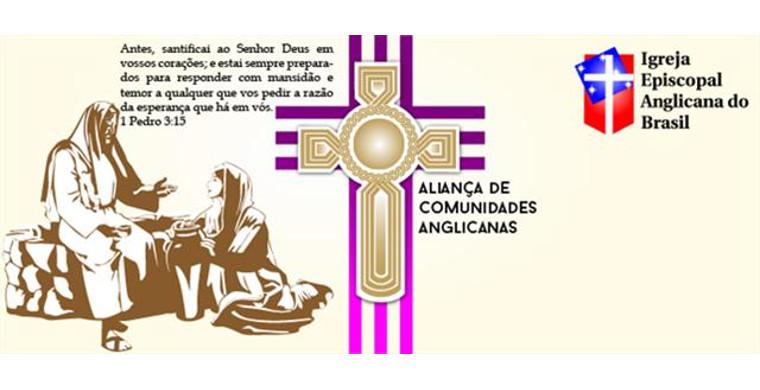BRAZIL: Anglican Episcopal Church clergy say they are being persecuted for upholding Biblical position on Marriage
A World Exclusive
By David W. Virtue, DD
www.virtueonline.org
January 11, 2017
A group of clergy of the Anglican Episcopal Church of Brazil say they are being persecuted for defending the biblical position on marriage and they want their Church to maintain its unity with the Anglican Communion.
In an e-mail to VIRTUEONLINE, nine clergy, including a bishop, say the chamber of bishops is imposing its position and wants them to affirm same-sex marriage. They are resisting all such efforts.
To that end they have formed the "Alliance of Anglican Communities", acknowledging the Anglican principle of unity in diversity, freedom of thought, opinion and initiative.
"We seek unity to make explicit and share the motives of our unity in Christ so that the Church we love so much will be strengthened more and more in its witness in society. In our Church, this is indispensable, because we cherish for unity in diversity, freedom of opinion and presence of movements that can enrich it with inclusiveness and comprehensiveness," they wrote.
"The Alliance of Anglican Communities in the IEAB is an open, dynamic and participatory movement formed by lay people and clergy who participate in different communities spread throughout Brazil. We wish to strengthen ties of "Covenant" and communion."
However, the House of Bishops have fought back, accusing the Alliance of fomenting schism.
"Any internal movement of the IEAB, deliberately organized without episcopal consent, constitutes a disobedience to the vow of ordination, to follow the pastoral orientation of the bishop, according to the Canonical Examination of the respective rites of ordination."
They said these "manifestation of threats of schism" constitute a "threat" and will be "subject to disciplinary measures."
"We call on all the people who have expressed or supported schismatic attitudes to change their attitude and seek to express and act to safeguard the unity of the church, its ethos, its canonical orders and their authorities in order to qualify this part of the Church, One, Holy, Catholic and Apostolic as an adequate instrument for the Mission of God in the world."
Their letter was signed by the bishop and primate, Don Francisco de Assis da Silva.
Alliance members fought back expressing "surprise" by the bishops' threat to their movement, saying that what they intended was just the opposite. "The misunderstanding only reveals the mood of intense relations and debates between us."
The term "covenant" has been purposely chosen, precisely because it is radically biblical and of great theological depth, as it relates above all to the quality of our relations, since it involves us personally and commits ourselves to God, the initiator of the " Covenant, "and between us; In order to avoid any "political", "partisan", or "ideological" connotation. "In the" IEAB ", we want to clearly indicate the perspective of initiative within the Church, including in the sense of" institution ", of which we are joyfully members, the clergy wrote.
"We have always lived in Anglicanism with the certainty that we are guaranteed the right to freedom of thought, opinion and initiative, unless it is proven that it is a formal heresy or a clear incitement to schism, which is not Absolutely the case. The principle of "unity in diversity" naturally follows pluralism."
The Alliance members pointed to the primate bishops of the Anglican Communion as a whole point and reiterated that recent developments in the Episcopal Church with respect to the change in their canons regarding marriage represent a profound departure from the faith and teaching maintained by most of our provinces over the doctrine of marriage. Possible developments in other provinces could exacerbate this situation, they wrote.
The Anglican Episcopal Church of Brazil is characterized by its progressive theological views on homosexuality. After the 1998 Lambeth Conference, the Anglican Church in Brazil decided to promote two national forums on human sexuality, both held in Rio de Janeiro. Its decisions guided the policy. According to the final document, the consensus of the Brazilian Church is that human sexuality is a gift from God, and it should be experienced in peace, freedom, love and respect. It is understood that the Church should respect the privacy of its members and clergy. Any kind of public exposure of someone's sexual orientation (as a pre-requisite to be a member or take part of any ministry) violates this privacy.
Because of that progressive position, the Bishop of the Diocese of Recife, the late Robinson Cavalcanti, a strong evangelical, declared Recife to be independent of the Church of Brazil, an action that resulted in his being deposed as a bishop by an Ecclesiastical Tribunal.
He maintained the view that the Brazilian Church was sympathetic to the ordination of Episcopal Bishop Gene Robinson, as well as the ordination of all LGBT people. This split the Diocese of Recife in two: one part loyal to Bishop Orlando Santos de Oliveira, primate of the Anglican Episcopal Church of Brazil, and currently coordinated by Bishop Sebastião Gameleira, and the other, under Cavalcanti's leadership, tied to the Anglican Church of the Southern Cone.
END














